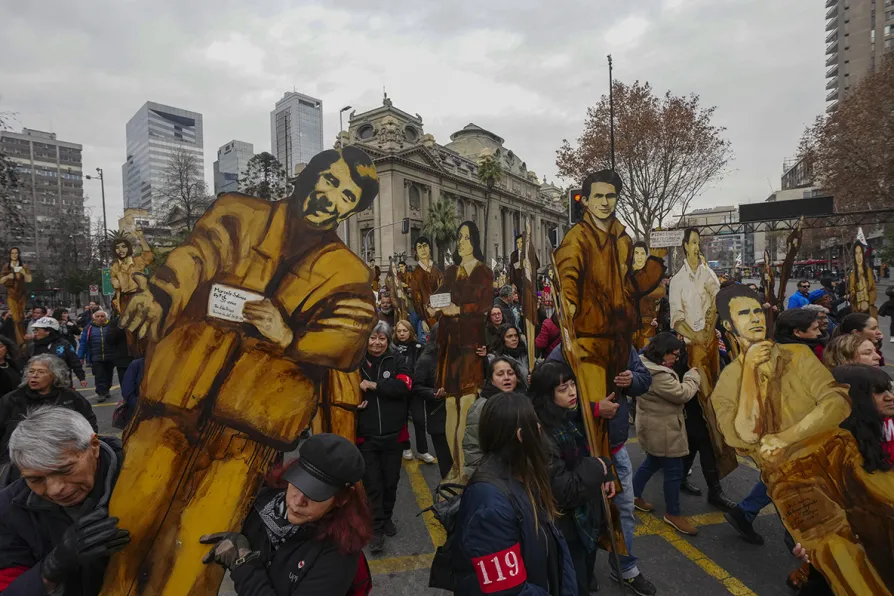NICK MATTHEWS recalls how the ideals of socialism and the holding of goods in common have an older provenance than you might think
A Chilean court ruled that funds were illegally taken by the dictator to accumulate family wealth that is now disputed among his heirs, writes PABLO MERIGUET

 Members of the Disappeared Detainees Relatives Group of Chile march with cardboard cutout depicting disappeared people, commemorating the 50th anniversary of the so-called "Operation Colombo" in Santiago, Chile, July 26, 2025
Members of the Disappeared Detainees Relatives Group of Chile march with cardboard cutout depicting disappeared people, commemorating the 50th anniversary of the so-called "Operation Colombo" in Santiago, Chile, July 26, 2025
ON September 11 1973, General Augusto Pinochet, with the support of the United States, led a coup d’etat against the democratically elected government of socialist President Salvador Allende, who was killed that same day. What followed was a brutal dictatorship led by Pinochet himself, which implemented a radical neoliberal economic transformation and lasted until 1990, when the dictatorship was ended in a popular referendum.
It is estimated that during the Pinochet dictatorship, more than 3,200 people were killed, 1,200 were disappeared, and thousands more were tortured.
For some Chileans, however, Pinochet was a kind of national hero who radically eliminated a potential socialist transformation in the Andean country.
One of them is the current right-wing presidential candidate, Evelyn Matthei, daughter of Fernando Matthei, a senior leader of the military junta and close collaborator of the dictator, who claims that it was a “necessary” dictatorship.
For many others, Pinochet, or Pinocchio, as he is popularly known, was a ruthless dictator who led a disastrous repression that left open wounds in Chilean society still felt to this day.
At the end of his life, once his bloody dictatorship had ended, Pinochet was accused of genocide, international terrorism, torture, and the disappearance of persons, which led to his arrest in London in 1998 by order of Spanish judge Baltasar Garzon.
However, the English courts decided to release him, and Pinochet returned to Chile, where he died in 2006 after several unsuccessful attempts to imprison him.
Pinochet’s legacy extends not only to politics but also to the economy. A few weeks ago, it was revealed that two of his sons had initiated a legal battle to be the beneficiaries of their father’s wealth, which had been inherited by Lucia Hiriart, the dictator’s wife.
Among the assets in dispute are eight properties, including an apartment in Santiago, beach houses, homes in various locations throughout Chile, and other real estate property.
What the heirs of the Pinochet clan (which has 16 potential heirs) did not expect was that the Seventh Civil Court of Santiago would order the restitution of more than $16 million that, according to the court, had been stolen from the public coffers.
According to investigations, Augusto Pinochet appropriated public funds through “reserved expenses” allocated to the presidency, the Military House and the Army Command.
The intention to recover the money originated from an investigation by the State Defence Council (CDE) in 2018, known as the “Riggs case.” In this regard, Raul Letelier, president of the CDE, said: “Seven years after it was filed, the lawsuit for profit from the wrongdoing of others, which is now fully upheld by the courts, is part of a series of actions taken by the State Defence Council to repair the exorbitant damage caused by the embezzlement of public funds committed by Pinochet and his collaborators.”
Many have celebrated the decision as an action that, while it does not bring back the blood spilled by Pinochet’s army, does mark a milestone in the fight against the dictatorship’s impunity, especially after investigations revealed a deep network of corruption that benefited the military coup leaders, including Pinochet, the supreme leader of a dictatorship that cannot be forgotten.
This article is republished from peoplesdispatch.org.










